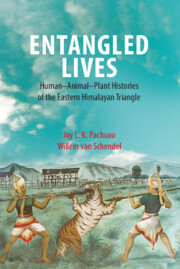9 - Exploiting Natural Resources
Published online by Cambridge University Press: 15 June 2022
Summary
The past 150 years have seen a remarkable acceleration of human interference in the Triangle's environment. Current practices are widely studied but too rarely with due awareness of the historical dimension. Understanding how this acceleration came about is crucial because the exploitation of natural resources is nothing new – it is the human condition. One of the main concerns today is to explain how humans came to choose so many practices that prove to be unsustainable. This chapter introduces some pieces of this complicated puzzle.
We have seen how an innate ability to manipulate the environment powered early human attempts to upgrade their habitat, often at the expense of other organisms (Chapter 2). Uniquely advantaged by their genetic makeup, humans could work together, communicate by means of language and accumulate knowledge from generation to generation. In the Triangle, as elsewhere in the world, humans proved to be superior ecosystem engineers. From uncertain beginnings, tens of thousands of years ago, they grew into the region's dominant species, imagining themselves increasingly in control of the area's future. Over time, their ecological footprint burgeoned.
The domestication of certain plants and animals created agriculture and animal husbandry, and these allowed human populations to maintain themselves and even expand (Chapter 3). As human numbers increased, especially since the nineteenth century, human landscaping overwhelmed forests, swamps and waterways. Highly engineered landscapes – agricultural fields and orchards; irrigation systems, dams, roads and railways; villages and towns – connected humans across the region and beyond. Throughout history, however, the region's basic characteristics moulded human options. Its destiny was shaped by deep geological association, a wet monsoon climate and enormous biodiversity. Numerous rivers connected the vertical landscape and provided a range of ecological opportunities at close range.
Beyond agriculture and animal husbandry, however, human manipulation of the environment took many forms. In this chapter, we focus on these practices. Most have a history going back many centuries, but some are of more recent origin. We begin with how people's relationship with plants and animals changed. The second section of the chapter deals with how people exploited inanimate resources.
Foraging undomesticated plants and animals
Our species has been foraging wild produce and animals from the earliest days of our arrival in the Triangle. These pursuits have sustained countless generations up to the present day.
Information
- Type
- Chapter
- Information
- Entangled LivesHuman-Animal-Plant Histories of the Eastern Himalayan Triangle, pp. 188 - 210Publisher: Cambridge University PressPrint publication year: 2022
